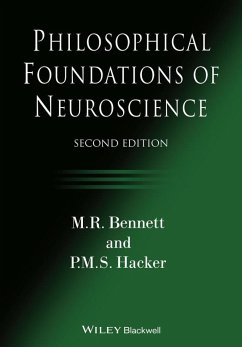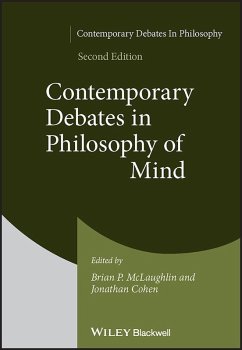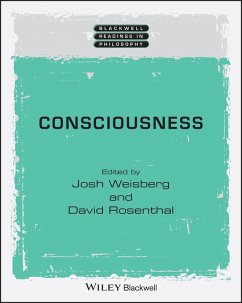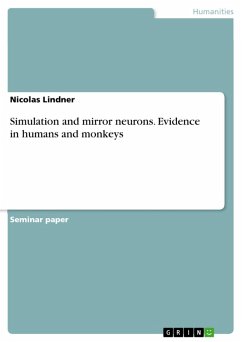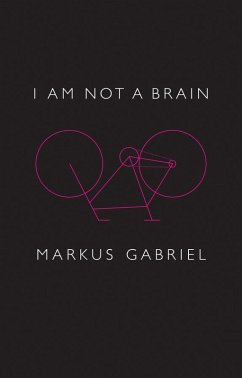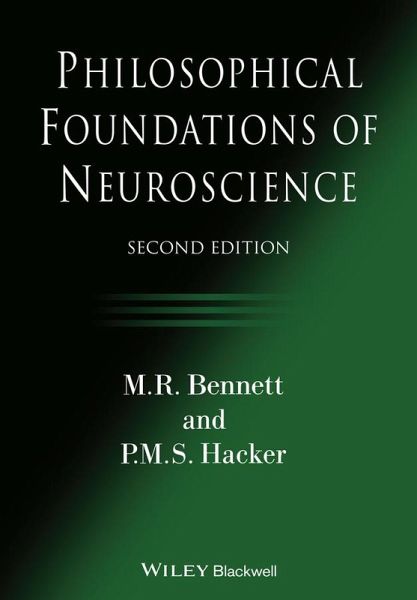
Philosophical Foundations of Neuroscience (eBook, ePUB)
Versandkostenfrei!
Sofort per Download lieferbar
33,99 €
inkl. MwSt.
Weitere Ausgaben:

PAYBACK Punkte
0 °P sammeln!
The second edition of the seminal work in the field--revised, updated, and extended In Philosophical Foundations of Neuroscience, M.R. Bennett and P.M.S. Hacker outline and address the conceptual confusions encountered in various neuroscientific and psychological theories. The result of a collaboration between an esteemed philosopher and a distinguished neuroscientist, this remarkable volume presents an interdisciplinary critique of many of the neuroscientific and psychological foundations of modern cognitive neuroscience. The authors point out conceptual entanglements in a broad range of majo...
The second edition of the seminal work in the field--revised, updated, and extended In Philosophical Foundations of Neuroscience, M.R. Bennett and P.M.S. Hacker outline and address the conceptual confusions encountered in various neuroscientific and psychological theories. The result of a collaboration between an esteemed philosopher and a distinguished neuroscientist, this remarkable volume presents an interdisciplinary critique of many of the neuroscientific and psychological foundations of modern cognitive neuroscience. The authors point out conceptual entanglements in a broad range of major neuroscientific and psychological theories--including those of such neuroscientists as Blakemore, Crick, Damasio, Dehaene, Edelman, Gazzaniga, Kandel, Kosslyn, LeDoux, Libet, Penrose, Posner, Raichle and Tononi, as well as psychologists such as Baar, Frith, Glynn, Gregory, William James, Weiskrantz, and biologists such as Dawkins, Humphreys, and Young. Confusions arising from the work of philosophers such as Dennett, Chalmers, Churchland, Nagel and Searle are subjected to detailed criticism. These criticisms are complemented by constructive analyses of the major cognitive, cogitative, emotional and volitional attributes that lie at the heart of cognitive neuroscientific research. Now in its second edition, this groundbreaking work has been exhaustively revised and updated to address current issues and critiques. New discussions offer insight into functional magnetic resonance imaging (fMRI), the notions of information and representation, conflict monitoring and the executive, minimal states of consciousness, integrated information theory and global workspace theory. The authors also reply to criticisms of the fundamental arguments posed in the first edition, defending their conclusions regarding mereological fallacy, the necessity of distinguishing between empirical and conceptual questions, the mind-body problem, and more. Essential as both a comprehensive reference work and as an up-to-date critical review of cognitive neuroscience, this landmark volume: * Provides a scientifically and philosophically informed survey of the conceptual problems in a wide variety of neuroscientific theories * Offers a clear and accessible presentation of the subject, minimizing the use of complex philosophical and scientific jargon * Discusses how the ways the brain relates to the mind affect the intelligibility of neuroscientific research * Includes fresh insights on mind-body and mind-brain relations, and on the relation between the notion of person and human being * Features more than 100 new pages and a wealth of additional diagrams, charts, and tables Continuing to challenge and educate readers like no other book on the subject, the second edition of Philosophical Foundations of Neuroscience is required reading not only for neuroscientists, psychologists, and philosophers, but also for academics, researchers, and students involved in the study of the mind and consciousness.
Dieser Download kann aus rechtlichen Gründen nur mit Rechnungsadresse in A, B, BG, CY, CZ, D, DK, EW, E, FIN, F, GR, HR, H, IRL, I, LT, L, LR, M, NL, PL, P, R, S, SLO, SK ausgeliefert werden.




